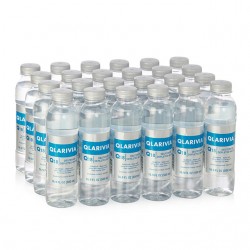What is deuterium?
Deuterium is one of the three Hydrogen isotopes.
The nucleus of most Hydrogen atoms in nature contains one proton, but the nucleus of some hydrogen atoms can contain one proton and one neutron or one proton and two neutrons.
The first and the most common isotope of Hydrogen is call Protium (chemical symbol: 1H), the second is named Deuterium (chemical symbol: 2H or D), and the third one is Tritium (chemical symbol: 3H or T).
Protium and Deuterium are a stable isotopes, but Tritium is an unstable one.
The abundance of deuterium in the water on Earth is approximately one deuterium atom to 6.400 hydrogen atoms (156,25 parts per million-ppm), or 0.0156%. This deuterium concentration changes very little from a natural water source to another.The deuterium concentration in the adult human body is approximately of 120 to 140 ppm. Although it doesn’t seem much, if we compare this concentration with concentration in plasma of other vital elements, we can see that deuterium is present in an amount six times greater than calcium and ten times greater than magnesium.



